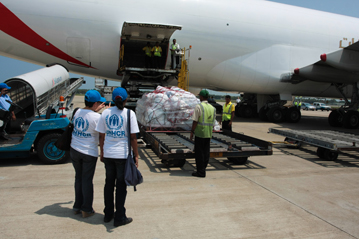UNHCR resumes Ivorian operation for now; top official voices hope and concern
UNHCR resumes Ivorian operation for now; top official voices hope and concern

TABOU/GENEVA, Jan 29 (UNHCR) - The UN refugee agency today partially resumed its operations in Côte d'Ivoire, sending 100 Liberian refugees home from the south-west amid a message of hope and concern by UNHCR Deputy High Commissioner Mary Ann Wyrsch.
On Wednesday, UNHCR staff in the southern Ivorian city of Abidjan returned to work after days of suspended operations. The agency also resumed the emergency repatriation of 100 Liberian refugees from Tabou in the south-west, but there are no guarantees that return convoys will take place on Thursday.
"We took the opportunity of a calm day today to organise a convoy. We got it ready in record time, a sign that everyone involved was eager to get the convoy going," said Anne Dolan, who heads UNHCR operations in Tabou. "The Liberians have been waiting anxiously since Sunday, and more are coming forward each day to register for returns at our Tabou office."
The refugee agency had suspended its operations in Côte d'Ivoire on Sunday as a result of violent protests in Abidjan and the overall climate of insecurity. To ensure the safety of its staff, UNHCR will assess the security situation on a daily basis. Much of the tone will depend on President Laurent Gbagbo's televised speech scheduled to take place Wednesday night.
"We are hopeful that the situation [in Côte d'Ivoire] will right itself," said UNHCR Deputy High Commissioner Wyrsch at a press briefing in Geneva Tuesday. "As Secretary-General Kofi Annan said, the future lies in the [Paris] accords. At this stage we can only hope that it [the tension] dies down."
Wyrsch was summing up her impressions from her recently-concluded 11-day mission to West Africa. From Jan 15-26, she visited Guinea, Sierra Leone, Liberia and Côte d'Ivoire, meeting with government officials, representatives from non-governmental agencies, as well as refugees and returnees.
The trip offered a mix of hope and concern. At the Guinean-Ivorian border, the Deputy High Commissioner saw "very frightened refugees" who had just fled Côte d'Ivoire. In Guinea and Liberia, she was struck by the desire of Sierra Leonean refugees to return home. And in Sierra Leone, she met returnees who were "full of energy and dynamism, working to rebuild their lives".

"Each government expressed willingness to keep its borders open," said Wyrsch, who thanked these refugee-hosting countries during her mission. She noted that UNHCR is currently working closely with the Liberian government to co-ordinate the emergency repatriation of Liberian refugees in Tabou.
However, more than 5,000 Liberian refugees at Nicla camp in western Côte d'Ivoire are still stranded in the volatile area, unable to return home because of their ethnic background. UNHCR appealed to regional governments in December to grant temporary asylum to these desperate refugees. "We have not had an overwhelming response to that," said Wyrsch. "We are still making our overtures in that area."
Asked about the funding situation in the West Africa region, the Deputy High Commissioner noted that in 2002, UNHCR appealed for supplementary funding on top of its regular budget to cope with the crises in Liberia and Côte d'Ivoire.
"These were relatively well funded," she said, adding that this year the refugee agency will likely increase its request for supplementary funds. "Donor response has been extremely good in this region and we hope it will continue."









